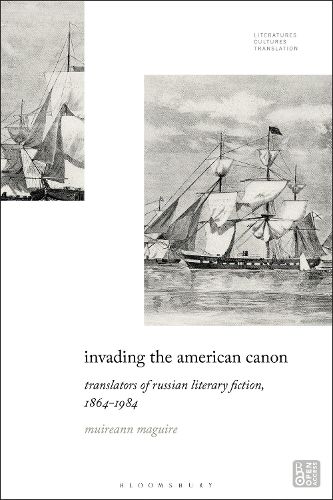Readings Newsletter
Become a Readings Member to make your shopping experience even easier.
Sign in or sign up for free!
You’re not far away from qualifying for FREE standard shipping within Australia
You’ve qualified for FREE standard shipping within Australia
The cart is loading…






Through case studies of emigre literary translators and editors, this open access book traces how Russian literature kindled the American imagination in the 20th century.
In the 19th century, American literature was invaded by great Russian novels, including the works of Turgenev, Tolstoy, Dostoevsky, Gorky, and others, all mediated, translated, and sometimes even discovered by devoted freelance translators like Isabel Hapgood, Leo Wiener, and Nathan Haskell Dole. Throughout the 1900s these translators made Russian literature, from Nobel prizewinners like Solzhenitsyn to obscure emigres like Mark Aldanov, accessible to American readers. Some literary translators were also publishers, like Nicholas Wreden (1901-55), at different times a bookseller at Scribner's, an editor at E.P. Dutton and a publishing executive at Little, Brown. His style was so well-regarded that Hemingway wished he wrote in Russian so that Wreden could translate him. He was also a lumberjack, a trainee naval officer and an emigre who fled Russia in 1920 to become a naturalized American citizen. Uniquely, as a translator and as a publisher, Wreden helped determine which Russian novels the American public would read.
This book tells Wreden's story. It also reconstructs, using archival sources, the lives of other extraordinary translator-publishers like Thomas Seltzer, Bernard Guilbert Guerney, and Carl Proffer, who, with his wife Ellendea, ran Ardis Publishers, the firm that brought Soviet writing to the US. Invading the American Canon tells the history of the translation of Russian literature in America and its changing critical reception over a hundred turbulent years.
The ebook editions of this book are available open access under a CC BY-NC-ND 4.0 licence on bloomsburycollections.com. Open access was funded by a European Research Council Horizon 2020 Starting Grant (grant agreement no. 802437)
$9.00 standard shipping within Australia
FREE standard shipping within Australia for orders over $100.00
Express & International shipping calculated at checkout
Through case studies of emigre literary translators and editors, this open access book traces how Russian literature kindled the American imagination in the 20th century.
In the 19th century, American literature was invaded by great Russian novels, including the works of Turgenev, Tolstoy, Dostoevsky, Gorky, and others, all mediated, translated, and sometimes even discovered by devoted freelance translators like Isabel Hapgood, Leo Wiener, and Nathan Haskell Dole. Throughout the 1900s these translators made Russian literature, from Nobel prizewinners like Solzhenitsyn to obscure emigres like Mark Aldanov, accessible to American readers. Some literary translators were also publishers, like Nicholas Wreden (1901-55), at different times a bookseller at Scribner's, an editor at E.P. Dutton and a publishing executive at Little, Brown. His style was so well-regarded that Hemingway wished he wrote in Russian so that Wreden could translate him. He was also a lumberjack, a trainee naval officer and an emigre who fled Russia in 1920 to become a naturalized American citizen. Uniquely, as a translator and as a publisher, Wreden helped determine which Russian novels the American public would read.
This book tells Wreden's story. It also reconstructs, using archival sources, the lives of other extraordinary translator-publishers like Thomas Seltzer, Bernard Guilbert Guerney, and Carl Proffer, who, with his wife Ellendea, ran Ardis Publishers, the firm that brought Soviet writing to the US. Invading the American Canon tells the history of the translation of Russian literature in America and its changing critical reception over a hundred turbulent years.
The ebook editions of this book are available open access under a CC BY-NC-ND 4.0 licence on bloomsburycollections.com. Open access was funded by a European Research Council Horizon 2020 Starting Grant (grant agreement no. 802437)